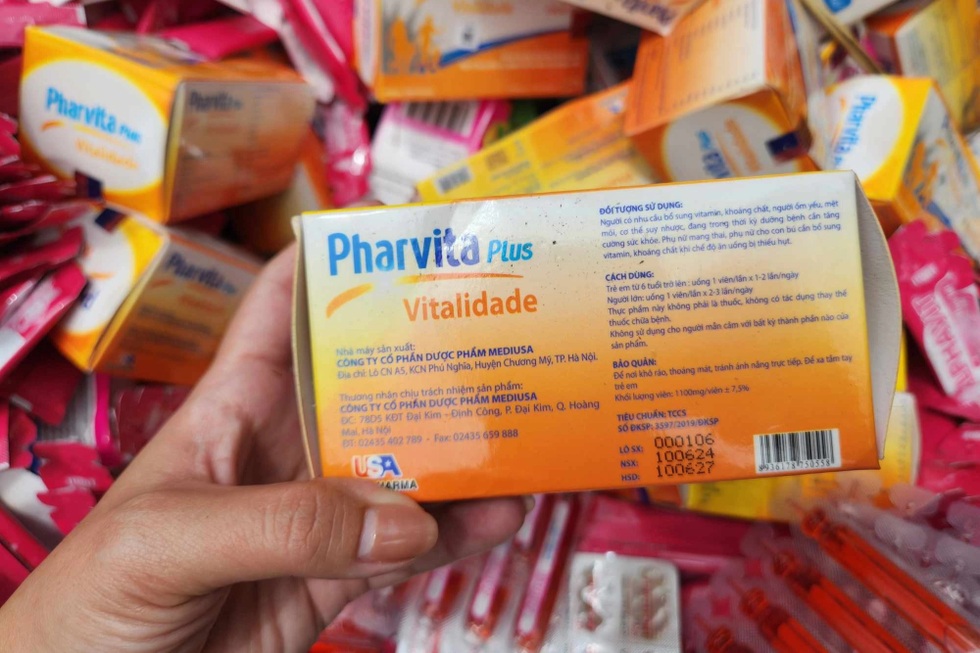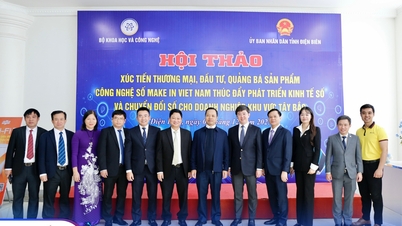Editorial: The functional food market in Vietnam is growing rapidly, but also has many potential risks regarding quality and origin. A series of cases of production and trading of fake and poor quality functional foods discovered recently have sounded the alarm about consumer health safety.
Dan Tri Newspaper carries out a series of articles "Functional foods: Understand correctly to use correctly" , to help readers clearly identify the difference between drugs and functional foods, and at the same time provide empirical information and recommendations from experts to avoid buying fake and counterfeit goods and use supplements properly and safely.
People no longer wait until they are sick to get treatment?
Working in an air-conditioned environment for 8 hours a day, Ms. QA, an office worker, said she often feels tired and sometimes feels like she has vertigo.
Fearing that her illness would become serious, she proactively went to the pharmacy to look for health care products and was advised to use a brain supplement containing DHA. However, the woman was hesitant because the product was produced by a brand she had never heard of, and the packaging was also quite sketchy.
"Although the product packaging has a GMP certificate, I don't know how to check whether this certificate is true or false," Ms. A. expressed.
Similarly, Ms. Lan Anh shared that she often buys functional foods (FF) to use during busy times to improve her health.
But now, there are many new brands appearing on the market, and recently the authorities have discovered many cases of production and trade of fake and counterfeit goods, making it difficult for her to choose a product.

People go to the pharmacy to buy health care products (Photo: LC).
Speaking to reporters, an expert in the field of clinical pharmacy said that in recent years, Vietnamese people's awareness of health care has shifted strongly from a passive treatment model to a proactive and comprehensive disease prevention model.
People no longer wait until they are sick to treat their health, but proactively seek solutions to improve their health. This is clearly demonstrated through actions such as: The demand for purchasing dietary supplements, vitamins and immune-enhancing products has increased; vaccinations to prevent diseases; general check-ups and cancer screening have become common habits, instead of only going to the doctor when symptoms appear.
In addition, the number of people participating in health insurance to proactively protect their finances against medical risks has increased. In addition, technological revolutions such as artificial intelligence (AI) and big data are gradually changing consumer habits.
“People are becoming more knowledgeable and demanding. Families are proactively seeking information about diseases, treatment regimens, medications, prevention measures and demanding transparency and integrity from healthcare providers. In addition, they also pay special attention to the origin, quality and relevant certifications when purchasing medicines and dietary supplements.
In that context, the role of state management is even more important in ensuring people's trust when choosing to use health care products," the analyst said.

To prevent poor quality, floating functional foods from reaching consumers, state management plays an important role (Illustration: NT).
International lessons in functional food management
To effectively manage state food supplements, experts say that, in addition to proactively tightening legal regulations, authorities can apply management lessons from developed countries.
For example, in the US and Europe, the importance of regulatory bodies such as the US Food and Drug Administration (FDA) and the European Food Safety Authority (EFSA) in the dietary supplement industry is undeniable. These two regions are extremely strict in advertising dietary supplements.
Specifically, they are only allowed to talk about support, not about cure. Dietary supplements are only allowed to advertise that they help support function (such as “calcium helps strengthen bones” but absolutely cannot say that it “cures osteoporosis”).
At the same time, dietary supplements always have mandatory warnings. Any dietary supplement product must have a large and clear line printed that says “this product is not a medicine and does not have the effect of replacing medicine”.
In Japan, to protect consumers from unintentional mistakes or intentional false advertising, the government has enacted strict laws regarding the display of health information and claims on labels and in advertisements.
Products certified by the Japanese government as FOSHU (Foods For Specified Health Uses) are often popular and trusted, because it means that the product is strictly controlled, has specific effects on human health and has scientific evidence, proven through clinical studies of effectiveness and safety.

A vitamin product dumped in a vacant lot in Ho Chi Minh City has caused a stir in public opinion recently (Photo: NT).
Based on lessons from advanced markets, experts recommend that Vietnam should accelerate the implementation of core reform strategies.
First, raise scientific standards in licensing and declaring the uses of dietary supplements (such as requiring clinical evidence of product effectiveness).
Second, strictly handle and strongly deter false advertising, protect consumer confidence and restore market order.
In addition, enhancing the consulting role of pharmacists in the community to ensure that dietary supplements are used for the right purposes and safely is also very important.
Digital transformation to serve the best "personalization"
Faced with the trend of people being more proactive in health care and becoming “smart consumers”, pharmaceutical and functional food distribution systems in Vietnam are promoting the application of technology to improve transparency, traceability and optimize user experience.

Enhancing the consulting role of pharmacists and ensuring that dietary supplements are used for the right purposes is very important (Photo: LC).
Many large pharmacies have now invested heavily in technologies such as artificial intelligence (AI), big data and cloud computing to automate management processes, quality control and support personalized advice.
These technology platforms are deeply integrated into the import-export process, expiry date tracking, product information lookup and safe usage instructions, helping to limit the situation of counterfeit and poor quality goods on the market.
“Since 2025, people have been able to buy medicine online safely and conveniently through the app-to-app connection solution between the Long Chau Pharmacy application and VNeID. This is an important step in connecting with electronic health books, helping people manage medical records, prescriptions, and medical examination and treatment history in a synchronous, accurate, and secure manner,” Long Chau shared.
Accordingly, Long Chau has focused on investing heavily in advanced technologies such as artificial intelligence (AI), big data... These technology platforms are deeply integrated into all processes, from operations, management to user experience, with the goal of improving efficiency, optimizing services and ensuring personal data security, especially in the medical field.
In particular, enhancing the consulting role of the pharmacist team is considered a key factor. Pharmacists are not only sellers but also companions, guiding people to choose functional foods for the right purpose, avoiding abuse, and at the same time updating official scientific information about the products.
Along with that, many pharmacy systems have deployed mobile applications and electronic portals, allowing people to look up product origins, track prescription history, set up automatic medication reminders, or make vaccination appointments for themselves and their families.

Pharmacists guide customers to check drug and functional food information via Long Chau's website and application (Photo: LC).
Some platforms also connect with electronic health books and VNeID identification accounts, helping users manage medical records, prescriptions and medical examination and treatment history synchronously, accurately and securely.
In addition to the private pharmacy sector, public hospitals and medical centers are also gradually digitizing their drug management systems, consumables, and health records, contributing to the formation of a comprehensive digital healthcare ecosystem that focuses on people.
From the perspective of experts, digital transformation not only helps businesses increase productivity and transparent management, but also opens up a new approach to "smart preventive medicine" - where each person can proactively manage, monitor and protect their own health with reliable digital tools.
Source: https://dantri.com.vn/suc-khoe/quan-ly-thuc-pham-chuc-nang-khi-nguoi-dan-khong-doi-benh-moi-chua-ky-3-20251007163910497.htm






































![[Photo] Worshiping the Tuyet Son statue - a nearly 400-year-old treasure at Keo Pagoda](/_next/image?url=https%3A%2F%2Fvphoto.vietnam.vn%2Fthumb%2F1200x675%2Fvietnam%2Fresource%2FIMAGE%2F2025%2F12%2F02%2F1764679323086_ndo_br_tempimageomw0hi-4884-jpg.webp&w=3840&q=75)
![[Photo] Parade to celebrate the 50th anniversary of Laos' National Day](/_next/image?url=https%3A%2F%2Fvphoto.vietnam.vn%2Fthumb%2F1200x675%2Fvietnam%2Fresource%2FIMAGE%2F2025%2F12%2F02%2F1764691918289_ndo_br_0-jpg.webp&w=3840&q=75)




































































Comment (0)